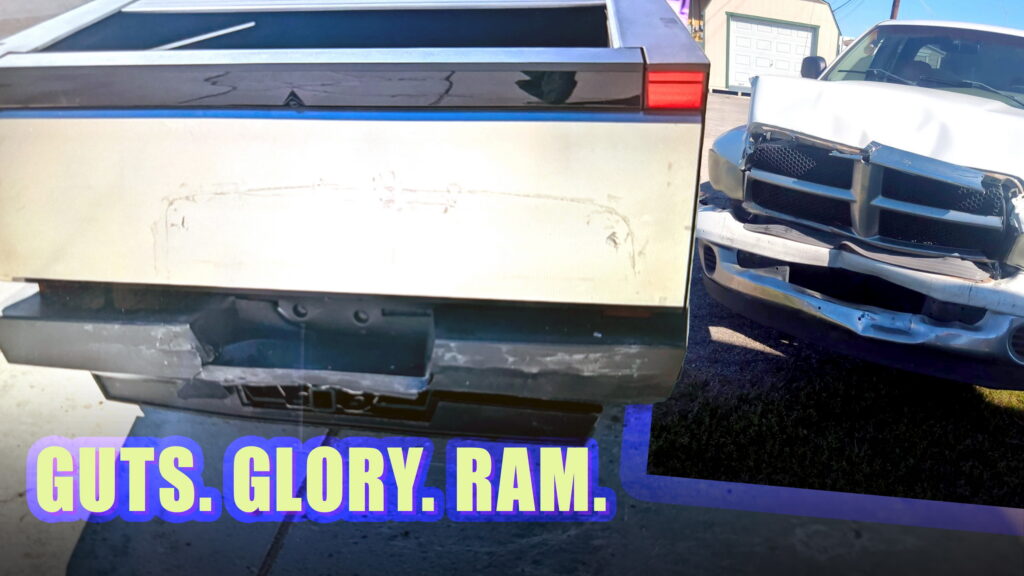A Dodge Ram owner recently attempted to live up to their vehicle’s name by ramming into the back of a Tesla Cybertruck that had just 450 miles (724 km) on the odometer. While the stainless steel truck did sustain some minor damage, the extent to which the third-generation Ram pickup from the mid-2000s crumpled has ignited further online debate surrounding the electric truck’s safety. However, despite the chatter, the crash reveals little, if anything, on that topic.
In a pair of photos posted to Reddit by user u/wamsankas, we can witness the aftermath of the rear-end collision between the two vastly different trucks. What has stirred controversy online is the stark contrast in the amount of damage sustained by the Ram compared to the lack thereof in the Tesla.
While the traditional truck’s hood is folded upwards, its bumper bent inward, and its grille broke, the Cybertruck emerged relatively unscathed, with only minor damage to the bumper and an imprint of a Ram grille on its tailgate. This stark contrast has sparked competing online debates about which vehicle performed better in the collision.
Read: First Recorded Tesla Cybertruck Crash On Public Roads
Credit: u/wamsankas via Reddit
It’s not surprising, really
While the extent of the damage to the Ram will likely result in quite a few headaches for its owner, especially since the OP claims the driver’s insurance card had expired, the apparent damage to each vehicle is hardly surprising.
In most accidents of this sort, the outcome would have likely appeared similar regardless of the vehicles involved. This is due to the nature of rear-end collisions, where drivers tend to slam on the brakes. For the vehicle in the rear, this results in the nose dipping down, causing the softer top part of the front to absorb the brunt of the impact. This section tends to be weaker for various reasons, often related to safety, so it typically appears to have sustained significantly more damage.
Meanwhile, if the lead driver was also slamming the brakes, that would raise the rear end, meaning that the more rigid bumper section absorbs more impact energy. Since it tends to be stronger, also for safety-related reasons, the lead vehicle tends to show less damage. Indeed, in this crash, the damage was largely focused on the Tesla’s bumper.
As you can see in the photos of a similar accident involving two wildly different vehicles below, this pattern of damage in rear-end accidents is common. What this means is that, based on the two photos shared by u/wamsankas, we can’t glean very much about how safe or strong the two vehicles involved in it are. They are both simply exhibiting typical behavior in such collisions.
Despite being silver, this Honda CR-V is not made of stainless steel. Credit: John Halas
We’ll have to wait until the results of the Tesla Cybertruck’s crash tests are released before we can definitively comment on its safety. However, recent reports indicate that independent crash testing for the truck may not be conducted anytime soon due to its limited production numbers at this stage.
Cybertruck’s Armored Glass Foils Thieves
One thing that the design team’s mission of putting the toughest part of the truck on the outside has accomplished is to make it more difficult to break into, as another video (this time posted to X) has shown.
User @MinimalDuck posted sentry mode camera footage of someone trying to break into one of their friends’ Cybertrucks. Cracks on the glass suggest that the person attempted to cut / break the window, and failed. What that will entail for occupants needing to exit their vehicle in the event of submersion and the necessity to escape is less clear.
Cybertruck is California-proof. Armored glass beats criminals trying their best to break in – even when jumping on the roof. @Tesla @cybertruck @elonmusk @teslaownersSV @oaklandpoliceca
— Arash Malek (@MinimalDuck) February 26, 2024
Don’t mess with Cybertruck. 📐 pic.twitter.com/S8Wt1tCcNC








